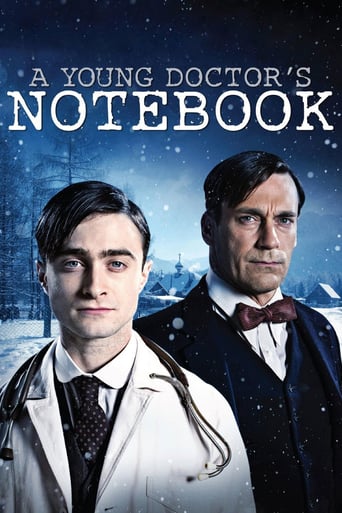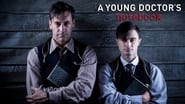Inesa Luneckaite
This is an extraordinary series with entertaining situations, great costume and set design, and excellent dark comedy. I like everything about it; its style, humor, and actors, except the length. For me, the idea seems very promising and it could really be prolonged into a standard TV show. Currently, there are two seasons with 4 episodes each of 23 minutes. As I see it, in 8 episodes so much has happened very quickly that I did not get a chance to fully enjoy the series and its brilliance. I simply think that the show is definitely worth watching and it can be quite addicting which makes it a shame it is not further and better developed as, I believe, it could really reach a wide audience and be really successful.
Katherina_Minola
Daniel Radcliffe stars as a young doctor, who in 1917, is sent to a remote village hospital in Russia, where he has to contend with eccentric staff, few supplies, and his own growing morphine addiction. Not to mention the various conversations he has with his older self (played by John Hamm).In parts, the show is quite gruesome - it certainly made me wince! - but it also manages to be extremely funny - sometimes guiltily funny, as I found myself laughing at the inappropriateness of certain comments and situations.Daniel Radcliffe surprised me by being very good as the younger doctor, while John Hamm is just super as his older, somewhat wiser self, who tries to stop his younger self from the mistakes he is about to make. The supporting cast are excellent, especially Adam Godley as the dull (to his colleagues, certainly not to the viewers) assistant.What I really liked is the inversion of the popular 'doctor as hero' storyline. This doctor is most certainly not a hero - he can be uncaring about his patients, filching morphine for his own use rather than for those who really need it, he is a coward at times, and incredibly selfish. And of course, he is able to see himself being all of those things, but is powerless to stop himself.It's well acted, well-written, will make you laugh and make you squirm - and it's definitely worth watching!
mary_vasilyeva
As a person who has read Bulgakov in the original, I can say that the series has not much to do with it. In fact, it may to a large extent arouse feelings of defeated expectations from those, who expect a serious attempt to reflect the Russian spirit of it all and portray Bulgakov's character on a profound level. Many Russian viewers have written about sketchiness of plot, cutting the original story into shreds, the whole atmosphere being generally out of tune.The point is that lots of Russian viewers feel robbed of the original story and therefore disappointed, ascribing their resentment simply to some shoddy directing, a script lacking in subtlety and class, and inexpressive acting. That is not the reason. All those aspects are quite legit in their own capacity. They are just miles and miles away from being "Russian". For better or for worse (in my humble opinion, definitely the previous), we face a phenomenon of Russian classics rendition, which is telling more about British national character and literary and cinematic tradition, than about anything else.Russian literature of the beginning of the XX century is quite a closed semiotic system. One cannot interpret it without knowing the context extensively. And by extensively I mean really extensively. You have to know a lot about the Revolution and the whole run-up to it, read the poets of Silver Age, Pasternak's "Doctor Zhivago", Russian philosophers later to be sent away on the so called "philosopher's ship". And that is only to get the historical context right. Apart from that, you need the literary one, as well. For that it is imperative that one should read Gogol… Oops. Which is impossible due to no adequate translations whatsoever (seriously, if you had read Gogol in English, I congratulate you on wasting many hours of your time).I prefer to think of this experiment with Russian literature as a study on the essence of British national character, which is quite showing in all the "faults" of the production (which are faults, only if you perceive them as such). In fact, comparing two autonomous variants of "A Young Doctor's Notebook" is far more productive, than seeking for blemishes.First of all, the principle difference is in the tone of those memoirs. Bulgakov sets a lyrical one: kind humor mixed with sincere sympathy for the main character. The maturing that happens with the doctor is positive, from an inexperienced, boyish and jittery medical student into a calmer and more confident practitioner. This transition does not involve falling into callousness or cynicism. In the British version it is evolution from enthusiasm to total boredom and helplessness to addiction and self-destruction.Let's take one story as an example, "A Towel with a Cockerel". It corresponds to the episode of amputation that Radcliffe's character has to face. In the original it is about facing one's fears for the sake of mercy and compassion. The girl's father's plea is touching, his gratefulness is heart-warming and the character is far more preoccupied with the girl's fate, than with his own ineptitude. The scene is gory, realistic and dramatic.In the British version father's character has a purely comical function. The scene of amputation focuses on the doctor's self-reflections. Its conceptual center is far from the ultimate value of human life. It is shifted towards neurotic ramblings, dark slap-stick humor (blunt saw!) and deep insecurities. I find it quite symptomatic that the "drama" part of the series is the deep internalized fear and inability to cope with the outer world. In fact, it is so important one actor is literally not enough. Therefore the older version of the character emerges, lending it some depth of perspective and diachronic approach.So, the main difference is in the importance of a deeply insecure character, desperately trying to prove himself in front of the scant society present. That socially-awkward vibe was virtually non-existent in Bulgakov's work, because it does not matter so much. There are some comical details, emphasizing the doctor's inexperience and naivety. Naivety is the operative word here, because that enthusiasm and hopefulness is seen as precious and endearing. Everybody is amused, and the character himself does not mind that much. In the series the doctor is mortified by his social faux pas, because that "inability for natural human communication" is one of the pillars the English society is built upon.With the focus shifted towards the character's inner conflict, one has to counterbalance it with some reasons for such an existential crisis in the outer world. That is where this idea of the hated "frozen pisshole" and the intolerable boredom come from. Actually, in the original there are rueful undertones about the general wretchedness and squalidness of Russia, but those undertones have been a default background for many a Russian book. They are taken for granted, and the instinctive reaction to them is light sadness and resignation with the state of affairs (talk about Russian fatalism). In the British variant the outer world is simply Hell, devouring any person with some level of intelligence and will.All in all, Radcliffe's character is very British in his need to be accepted in this small model of society, in his intellectual craving for something more in the middle of nowhere, in his self-obsessiveness. The atmosphere on the whole is British due to the predominance of typical black humor, gore, sarcasm, dry humor and even a shade of surrealism, close to "Monty Python" in the absurdity of (I hope, intentionally) gaudy pseudo-Russian theatrical decorations, clashing with the story of a young, ambitious (a dubious compliment for the English) and overly enthusiastic (a deadly sin for the English) doctor, who might as well have been English himself.From my point of view, if you get rid of ridiculously pronounced "Grachovka" and change the setting into a God forsaken village of Cornwall it will all make much more sense.




